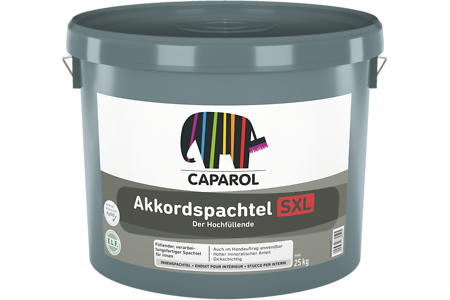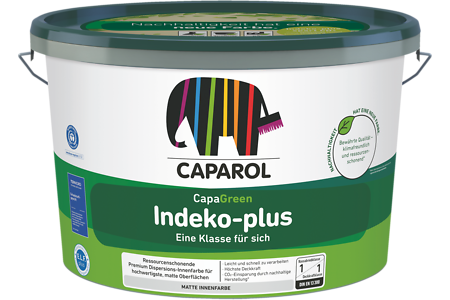Field of Application
Highly opaque, versatile interior paint for wall and ceiling coatings with a matt finish and optimum application properties. Ideal for use in prestigious work and living areas.Material Properties
- Emission minimised and solvent-free
- Free of fogging-active substances
- Water-thinnable, ecologically compatible, low odour
- High yield.
- Plasticizer-free.
- diffusible
- sd-value < 0.1 m
Material Base / Vehicle
Plastic dispersionPackaging/Package Size
- Standard Product: 2.5 l, 5 l, 12.5 l and 15 l. Airfix: 25 l Hobbock and 120 l paint barrel
- Old white 10: 12.5 l
- Light white 16: 15 l.
- ColorExpress: 2.5 l, 7.5 l and 12.5 l
Colours
- White
- Old white (approx. RAL 9010)
- Light white (approx. RAL 9016)
Tintable with AmphiColor® Vollton- und Abtönfarben or with CaparolColor Vollton- und Abtönfarben. In case of self-tinting, mix the total quantity required to avoid differences in color shade.
For orders of 100 liters and more in one color and order, also available factory-tinted on request.
CapaMaXX can be tinted by machine via ColorExpress according to all common color systems. In order to detect possible tinting errors, please check the color shade before application. Only use color shades of the same batch on continuous surfaces. When using slightly opaque colors such as red, orange, yellow, we recommend a priming coat of CapaMaXX in the appropriate priming system color. The corresponding priming system shades are available from ColorExpress Tinting Technology. A second top coat may be required.
Gloss Level
G4-Dull matt (Dead-matt according to DIN EN 13 300).Storage
Keep in a cool, but frost-free place.Technical Data
Characteristics according to DIN EN 13 300:Tinting may cause variations.
Wet abrasion
R-class 2Contrast ratio
Opacity (hiding/covering power) class 1, with a spreading rate of 8 m2/l or a consumption of approx. 125 ml/m2Maximum particle (grit) size
S1-fine (< 100 µm)Density
Approx. 1.5 g/cm3Note
CapaMaXX is a dull matt, hard-wearing synthetic dispersion paint that is classified in wet abrasion class 2 according to DIN EN 13 300. Due to these properties, CapaMaXX is considered a matt latex paint and can be used without restrictions in areas with corresponding requirements.Suitability according to Technical Information No. 606 Definition of Application Areas
| Interior 1 | Interior 2 | Interior 3 | Exterior 1 | Exterior 2 |
| + | + | – | – | – |
| (–) inapplicable / (○) of limited suitability / (+) suitable | ||||
Suitable Substrates
The substrate must be sound/stable, dry, clean, and free from all substances that may prevent good adhesion. In Germany: Follow VOB, part C, DIN 18 363, section 3.
Substrate Preparation
Renders according to DIN EN 998-1 class CS II - CS IV / compressive strength min. 2 N/mm2: Solid, normally absorbent and even renders can be coated without primer coat. Prime slightly sanding, absorbent renders with OptiSilan TiefGrund, CapaSol RapidGrund or Sylitol RapidGrund 111. Prime more sanding renders with OptiSilan TiefGrund.
Gypsum plasters according to DIN EN 13279-1 / compressive strength min. 2 N/mm2: Sand and remove dust from gypsum plasters with sintered skin, prime with OptiSilan TiefGrund, CapaSol RapidGrund or Sylitol RapidGrund 111.
Gypsum boards/gypsum planks: Priming coat with OptiSilan TiefGrund.
Gypsum boards (plasterboard): Sand off filler burrs. Prime sanded gypsum filler areas and the gypsum boards with OptiSilan TiefGrund, CapaSol RapidGrund or Sylitol RapidGrund 111. In case of stronger absorption, prime with OptiSilan TiefGrund. For boards with water-soluble, discolouring ingredients, prime with Caparol AquaSperrgrund. Observe BFS Data Sheet No. 12, Part 2.
Concrete: Remove any release agent residues and chalking, sanding substances. Prime with OptiSilan TiefGrund, CapaSol RapidGrund or Sylitol RapidGrund 111.
Sand-lime masonry: Dry brush off existing salt efflorescence. Prime with CapaSol RapidGrund or Sylitol® Rapidgrund 111. In case of stronger absorption, prime with OptiSilan TiefGrund.
Load-bearing coatings: Recoat matt, slightly absorbent coatings directly. Roughen glossy surfaces and paint coatings.
Non-bearing coatings: Remove non-stable varnish and dispersion paints or synthetic resin plaster coatings. Prime coarsely porous, sanding or absorbent surfaces with OptiSilan TiefGrund. Remove non-bearing mineral paint coatings mechanically and remove dust from the surfaces. Apply one priming coat of OptiSilan TiefGrund.
Glue-Bound Distemper (Limewater Colour/Paint): Wash off the existing distemper very thoroughly, allow to dry and prime with Dupa-Putzfestiger. Alternatively, remove mechanically, rinse and prime with OptiSilan TiefGrund.
Woodchip, relief or embossed wallpapers made of paper and sample wallpapers: Coat without pre-treatment. For relief and embossed wallpapers made of paper as well as sample wallpapers, apply a trial coat. Foamed wallpapers may cause intermediate reactions (stickiness, odour) when coated.
Removed wallpaper: Wash off paste and waste paper residues. Apply one priming coat of OptiSilan TiefGrund.
Mould-infested surfaces: Remove mould by wet cleaning. Wash surfaces with Capatox and allow to dry thoroughly. Observe the legal and official regulations (e.g. the Biological Substances Ordinance and the Ordinance on Hazardous Substances). Increased protection against renewed infestation can be achieved with the products Malerit-W, Indeko-W and Fungitex-W.
Surfaces with nicotine, water, soot or grease stains: Wash off nicotine stains as well as soot or grease stains with water, adding a grease-dissolving cleaning agent, and allow to dry thoroughly. Clean dried water stains by brushing dry. Apply a barrier priming coat of Caparol AquaSperrgrund fein (see Technical Information No. 384) orCaparol-Filtergrund grob (see Technical Information No. 845).
Wood and wood-based materials: Apply one priming coat of Capacryl Holz-Isogrund. On boards factory-coated with melamine resin, apply one priming coat of Capacryl-Haftprimer. The joint areas/panel joints are not to be finished crack-free. Here, for higher visual requirements, a decoupling layer with thin gypsum boards with appropriate filling is recommended.
Old lime filler techniques: Remove sintered layer on the surface by sanding. In case of negative wetting test with water on sanded surface, the entire lime filler layer must be removed and the substrate must be rebuilt accordingly. In case of positive wetting test with water on sanded surface, prime with OptiSilan TiefGrund.
Chips, joints and defects: Fill the recess with Füllspachtel P.
Note Q2/Q3 Filling / thin gypsum layers < 0.5 mm: When using gypsum-containing, hydraulically setting levelling compounds in quality level Q2/Q3, a transparent, water-based primer is recommended. For this, we refer to the Maler&Lackierer leaflet No. 2 -9/2020 "Adhesion problems of coatings on filled gypsum (cardboard) boards" of the Bundesverband Farbe, Gestaltung, Bautenschutz and the Bundesausschuss Farbe und Sachwertschutz. As an alternative to gypsum-based Q3 filling, filling with pasty filling compounds has proven successful.
Method of Application
Apply with paint brush, roller or airless equipment.Airless application:
| Dilution | max. 5% mit Wasser |
| Airless equipment | |
| Spray pressure | 150 - 180 bar |
| Spray angle | 40° - 50° |
| Nozzle size | 0,019" - 0,021" |
| Pistol filter in MW | ca. 0,31mm |
| Internally fed roller systems | |
| Spray pressure | 80 - 120 bar |
| Pistol filter in MW | ca. 0,31mm |
Clean tools immediately after use with water.
Surface Coating System
White coating:A rich, even coat of CapaMaXX undiluted or diluted with a maximum of 5 % water. On high-contrast surfaces, apply a primer coat first, diluted with a maximum of 10 % water. On differently absorbent substrates, apply a primer coat of HaftGrund EG.
Colored coating:
When using intensive color tones, we recommend a primer coat with Caparol-Haftgrund EG in the matching primer system color tone.
Stir the material thoroughly immediately before use.
To avoid roll streaks, apply a thick and even coat and always roll in one direction after a short flash-off time. Always apply trimming areas wet-on-wet. Reworking should be carried out with great care, especially with intensive color tones.
Practical tip: To create low-textured surfaces, apply CapaMaXX evenly and after a short flash-off phase, gently re-roll with Caparol FeinRoller.
Translated with DeepL
Consumption
Approx. 125 ml/m2 per coat on an even substrate. On rough-textured surfaces correspondingly more. The exact consumption is best established by a trial coating on site.Application Conditions
Lower Temperature Limit for Application and Drying:+5 °C for product, substrate and ambient air.
Drying/Drying Time
At +20 °C and 65 % relative humidity surface-dry and recoatable after 4 - 6 hrs. Completely cured and ready for stress after approx. 3 days. Lower temperatures and higher relative humidity extend the drying time.Note
To avoid build-up, coat wet-on-wet in one go. When applying by airless spraying, stir the paint well and sieve. For surfaces exposed to unfavorable light conditions (grazing light), we recommend using CapaSilan. In case of dark color shades, mechanical stress (scratching) may result in light streaks. For mechanically stressed surfaces with intensive color shades we recommend an additional protective coating with PremiumColor of the same color shade. Markings from touch-ups in the surface depend on many factors and are therefore unavoidable (BFS Leaflet 25).
German Certificates
- Testing of disinfectant resistance by the Dr. Robert Murjahn Institute.
Please Note (Status as at Date of Publication)
If medical advice is needed, have product container or label at hand. Keep out of reach of children. Warning! Hazardous respirable droplets may be formed when sprayed. Do not breathe spray or mist. Contains 1,2-benzisothiazol-3(2H)-one, reaction mass of 5-chloro-2-methyl-2H-isothiazol-3-one and 2-methyl-2H-isothiazol-3-one (3:1). May produce an allergic reaction. For further details see Material Safety Data Sheet (MSDS).
Disposal
Materials and all related packaging must be disposed of in a safe way in accordance with the full requirements of the local authorities.
In Germany: Only completely emptied containers must be given for recycling. Dispose containers with residues of liquid product via waste collection point accepting old paints and enamels. Dispose dried/hardened product residues as construction site/demolition/municipal or domestic waste.
EU limit value for the VOC content
of this product (category A/a): 30 g/l (2010). This product contains < 1 g/l VOC.Product Code Paints and Enamels
BSW20Substances of Content - Declaration
Polyvinyl acetate resin, titanium dioxide, silicates, water, additives, preservative (methylisothiazolinone, benzisothiazolinone).Customer Service Centre
Tel.: +49 6154 71-71710Fax: +49 6154 71-71711
e-mail: kundenservicecenter@caparol.de
International Distribution: Please see www.caparol.com
Technical information
Sustainability data sheet
- Sustainability Fact Sheet CapaMaXX Airfix
- Sustainability Fact Sheet CapaMaXX Basis 1
- Sustainability Fact Sheet CapaMaXX
- Sustainability Fact Sheet CapaMaXX Basis 2
Material safety data sheet
- System instructions CapaMaXX Lichtweiß 16 Airfix
- System instructions CapaMaXX Lichtweiß 16
- System instructions CapaMaXX Basis 1
- System instructions CapaMaXX Basis 2
- System instructions CapaMaXX Basis 3
- System instructions CapaMaXX Basis 1
- System instructions CapaMaXX Basis 3
- System instructions CapaMaXX
- System instructions CapaMaXX Altweiß
- System instructions CapaMaXX Airfix
Technical information
Sustainability data sheet
- Sustainability Fact Sheet CapaMaXX Airfix
- Sustainability Fact Sheet CapaMaXX Basis 1
- Sustainability Fact Sheet CapaMaXX
- Sustainability Fact Sheet CapaMaXX Basis 2
Material safety data sheet
- System instructions CapaMaXX Lichtweiß 16 Airfix
- System instructions CapaMaXX Lichtweiß 16
- System instructions CapaMaXX Basis 1
- System instructions CapaMaXX Basis 2
- System instructions CapaMaXX Basis 3
- System instructions CapaMaXX Basis 1
- System instructions CapaMaXX Basis 3
- System instructions CapaMaXX
- System instructions CapaMaXX Altweiß
- System instructions CapaMaXX Airfix











